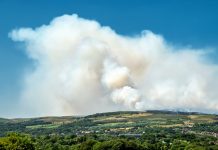Nikolas Kairinos, CEO, Fountech.ai, discusses why artificial intelligence (AI) holds the key to solving the climate crisis
Only a few months ago, the climate crisis was the biggest challenge facing our planet. Since then, public attention has naturally shifted to tackling the COVID-19 pandemic; however, we cannot lose sight of huge environmental issues that require urgent attention.
Despite a great deal of public discourse about the fate of the planet – and many well-meaning initiatives introduced by governments and companies around the world – halting or even reversing climate change remains a distant target.
Challenging consumer behaviour, hosting global summits and penalising businesses for their carbon footprints are positive steps. But they are not enough. We need a powerful force to spearhead the fight against the climate crisis. Could artificial intelligence (AI) be the answer?
AI and machine learning (ML) are next-generation technologies that can meaningfully help us protect the planet. To demonstrate this point, here are a few examples of how AI and ML are already being used in practice…
Cutting through the noise
It is incredibly difficult to introduce effective solutions to a problem if you do not truly understand its roots or how it will evolve. For decades, data scientists have been using climate modelling to overcome this challenge; by analysing patterns in the environment, researchers have been able to create forecasts of how conditions might change in the near future.
This field is certainly not new: the first system was created over 50 years ago. Intelligent algorithms, however, bring something new to the table. They allow data scientists to spot patterns that would otherwise be overlooked and extrapolate insights from complicated data. Just think how much information from our land, oceans and atmosphere is needed to understand how they are changing. AI makes the process of analysing vast data sources a whole lot more manageable.
AI gives us better awareness of environmental issues and cuts through the noise to help us determine what is most important. For instance, aided by a grant from Microsoft and access to its AI tools, researchers from the Data Science Institute were recently able to study the effect of Hurricane Maria on Puerto Rico’s El Yunque National Forest in a way they could not have done before.
It would be virtually impossible to survey a forest of such size using only ground-based observations – it covers an impressive 28,000 acres and is home to some 240 tree species. Instead, the researchers turned to advanced imagine and remote-sensing technologies that helped them study the damage more effectively. Through its ability to discern between different tree species, AI-computer vision helped to extract insights from images of the forest to determine the damage caused.
A data-driven and AI-intensive approach offered the ability to study ecological damage of a huge scale, and analyse valuable data from the aftermath of the hurricane. In turn, insights gleaned by AI were used to provide a clearer picture of how tropical storms affect our environment.
Monitoring and measuring pollution
To reduce human impact on the climate, we need industries to work together with governments to lower our emissions. However, keeping track of data from the world’s most polluting industries is a mission in itself – let alone ensuring that industry players are abiding by emissions caps and employing ‘greener’ practices.
The arrival of artificial intelligence, however, gives us a way to reduce the harmful emissions being pumped into the air. We are now capable of processing huge volumes of data from power plants in order to boost efficiency and optimise operations. Sensors installed across power plants can collect information on all aspects of a plant’s operations, with the processing capacity of algorithms allowing us to monitor performance and make improvements to the way they are run.
AI can also seek out those who are flouting rules designed to reduce pollution, as well as offering greater transparency over poor energy practices. Indeed, Carbon Tracker recently announced a new project which will use satellite imagery to both detect and quantify carbon emissions from large power plants worldwide. It will then make this information available to the public.
Through such measures, they hope to hold polluting plants accountable and improve global environmental standards.
Helping consumers help the environment
A little closer to home, everyday technologies are empowering consumers to make more environmentally-conscious decisions. Already, AI is an enabler of many solutions that we now use to lead ‘greener’ lives.
One place to start our efforts is with transportation. Autonomous vehicles that do not rely on fuel, for instance, are helping wean us off polluting forms of transport. As the technology becomes more accessible, this has the potential to make a significant impact – in 2017, more than a quarter (27%) of total EU greenhouse gas emissions came from the transport sector. This just drives home the damage that our daily commute might be causing to the planet.
AI is also making renewable energy technology like solar panels more efficient and cost effective, helping to combat our reliance on fossil fuels. On a smaller scale, AI-powered smart meters that are now commonly installed in homes pull in and analyse data from multiple sources, allowing people to track their energy usage and adapt their behaviour to reduce their consumption.
Smart meters save energy by allowing for two-way communication between the power grid and users, giving energy providers a better understanding of usage. They can also use this information to make real-time adjustments to boost efficiency. In the years to come, we will see algorithms increasingly being used in this way to determine when and how best to generate and supply energy.
If used wisely, I have no doubt that AI will accelerate our sustainability efforts. AI is already shaping up to be the key to empowering governments, organisations and individuals to make more conscious decisions and work towards creating a healthier planet.











